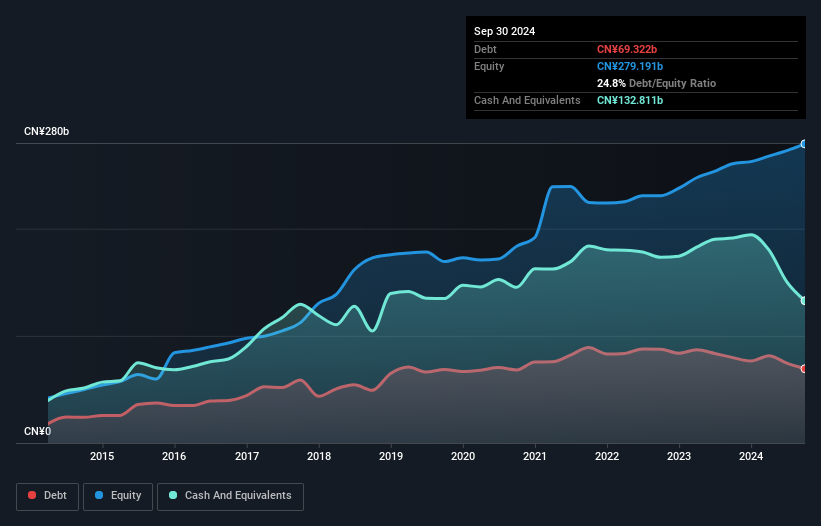- United States
- /
- Interactive Media and Services
- /
- NasdaqGS:BIDU
Baidu (NASDAQ:BIDU) Seems To Use Debt Rather Sparingly

Howard Marks put it nicely when he said that, rather than worrying about share price volatility, 'The possibility of permanent loss is the risk I worry about... and every practical investor I know worries about.' It's only natural to consider a company's balance sheet when you examine how risky it is, since debt is often involved when a business collapses. Importantly, Baidu, Inc. (NASDAQ:BIDU) does carry debt. But the more important question is: how much risk is that debt creating?
When Is Debt A Problem?
Debt is a tool to help businesses grow, but if a business is incapable of paying off its lenders, then it exists at their mercy. Part and parcel of capitalism is the process of 'creative destruction' where failed businesses are mercilessly liquidated by their bankers. While that is not too common, we often do see indebted companies permanently diluting shareholders because lenders force them to raise capital at a distressed price. Of course, the upside of debt is that it often represents cheap capital, especially when it replaces dilution in a company with the ability to reinvest at high rates of return. When we think about a company's use of debt, we first look at cash and debt together.
See our latest analysis for Baidu
How Much Debt Does Baidu Carry?
You can click the graphic below for the historical numbers, but it shows that Baidu had CN¥69.3b of debt in September 2024, down from CN¥79.7b, one year before. But it also has CN¥132.8b in cash to offset that, meaning it has CN¥63.5b net cash.

A Look At Baidu's Liabilities
Zooming in on the latest balance sheet data, we can see that Baidu had liabilities of CN¥78.4b due within 12 months and liabilities of CN¥59.7b due beyond that. On the other hand, it had cash of CN¥132.8b and CN¥11.2b worth of receivables due within a year. So it can boast CN¥5.91b more liquid assets than total liabilities.
This surplus suggests that Baidu has a conservative balance sheet, and could probably eliminate its debt without much difficulty. Succinctly put, Baidu boasts net cash, so it's fair to say it does not have a heavy debt load!
Fortunately, Baidu grew its EBIT by 8.0% in the last year, making that debt load look even more manageable. There's no doubt that we learn most about debt from the balance sheet. But ultimately the future profitability of the business will decide if Baidu can strengthen its balance sheet over time. So if you want to see what the professionals think, you might find this free report on analyst profit forecasts to be interesting.
Finally, a business needs free cash flow to pay off debt; accounting profits just don't cut it. While Baidu has net cash on its balance sheet, it's still worth taking a look at its ability to convert earnings before interest and tax (EBIT) to free cash flow, to help us understand how quickly it is building (or eroding) that cash balance. Over the last three years, Baidu recorded free cash flow worth a fulsome 99% of its EBIT, which is stronger than we'd usually expect. That positions it well to pay down debt if desirable to do so.
Summing Up
While it is always sensible to investigate a company's debt, in this case Baidu has CN¥63.5b in net cash and a decent-looking balance sheet. And it impressed us with free cash flow of CN¥20b, being 99% of its EBIT. So we don't think Baidu's use of debt is risky. Over time, share prices tend to follow earnings per share, so if you're interested in Baidu, you may well want to click here to check an interactive graph of its earnings per share history.
At the end of the day, it's often better to focus on companies that are free from net debt. You can access our special list of such companies (all with a track record of profit growth). It's free.
Valuation is complex, but we're here to simplify it.
Discover if Baidu might be undervalued or overvalued with our detailed analysis, featuring fair value estimates, potential risks, dividends, insider trades, and its financial condition.
Access Free AnalysisHave feedback on this article? Concerned about the content? Get in touch with us directly. Alternatively, email editorial-team (at) simplywallst.com.
This article by Simply Wall St is general in nature. We provide commentary based on historical data and analyst forecasts only using an unbiased methodology and our articles are not intended to be financial advice. It does not constitute a recommendation to buy or sell any stock, and does not take account of your objectives, or your financial situation. We aim to bring you long-term focused analysis driven by fundamental data. Note that our analysis may not factor in the latest price-sensitive company announcements or qualitative material. Simply Wall St has no position in any stocks mentioned.
About NasdaqGS:BIDU
Baidu
Provides online marketing and non-marketing value added services through an internet platform in the People’s Republic of China.
Undervalued with solid track record.
Similar Companies
Market Insights
Community Narratives



